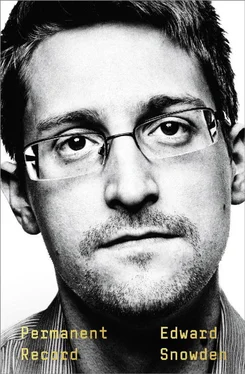Meanwhile, the private sector was busy leveraging our reliance on technology into market consolidation. The majority of American Internet users lived their entire digital lives on email, social media, and e-commerce platforms owned by an imperial triumvirate of companies (Google, Facebook, and Amazon), and the American IC was seeking to take advantage of that fact by obtaining access to their networks—both through direct orders that were kept secret from the public, and clandestine subversion efforts that were kept secret from the companies themselves. Our user data was turning vast profits for the companies, and the government pilfered it for free. I don’t think I’d ever felt so powerless.
Then there was this other emotion that I felt, a curious sense of being adrift and yet, at the same time, of having my privacy violated. It was as if I were dispersed—with parts of my life scattered across servers all over the globe—and yet intruded or imposed upon. Every morning when I left our town house, I found myself nodding at the security cameras dotted throughout our development. Previously I’d never paid them any attention, but now, when a light turned red on my commute, I couldn’t help but think of its leering sensor, keeping tabs on me whether I blew through the intersection or stopped. License-plate readers were recording my comings and goings, even if I maintained a speed of 35 miles per hour.
America’s fundamental laws exist to make the job of law enforcement not easier but harder. This isn’t a bug, it’s a core feature of democracy. In the American system, law enforcement is expected to protect citizens from one another. In turn, the courts are expected to restrain that power when it’s abused, and to provide redress against the only members of society with the domestic authority to detain, arrest, and use force—including lethal force. Among the most important of these restraints are the prohibitions against law enforcement surveilling private citizens on their property and taking possession of their private recordings without a warrant. There are few laws, however, that restrain the surveillance of public property, which includes the vast majority of America’s streets and sidewalks.
Law enforcement’s use of surveillance cameras on public property was originally conceived of as a crime deterrent and an aid to investigators after a crime had occurred. But as the cost of these devices continued to fall, they became ubiquitous, and their role became preemptive—with law enforcement using them to track people who had not committed, or were not even suspected of, any crime. And the greatest danger still lies ahead, with the refinement of artificial intelligence capabilities such as facial and pattern recognition. An AI-equipped surveillance camera would be no mere recording device, but could be made into something closer to an automated police officer—a true robo-cop actively seeking out “suspicious” activity, such as apparent drug deals (that is, people embracing or shaking hands) and apparent gang affiliation (such as people wearing specific colors and brands of clothing). Even in 2011, it was clear to me that this was where technology was leading us, without any substantive public debate.
Potential monitoring abuses piled up in my mind to cumulatively produce a vision of an appalling future. A world in which all people were totally surveilled would logically become a world in which all laws were totally enforced, automatically, by computers. After all, it’s difficult to imagine an AI device that’s capable of noticing a person breaking the law not holding that person accountable. No policing algorithm would ever be programmed, even if it could be, toward leniency or forgiveness.
I wondered whether this would be the final but grotesque fulfillment of the original American promise that all citizens would be equal before the law: an equality of oppression through total automated law enforcement. I imagined the future SmartFridge stationed in my kitchen, monitoring my conduct and habits, and using my tendency to drink straight from the carton or not wash my hands to evaluate the probability of my being a felon.
Such a world of total automated law enforcement—of, say, all pet-ownership laws, or all zoning laws regulating home businesses—would be intolerable. Extreme justice can turn out to be extreme injustice, not just in terms of the severity of punishment for an infraction, but also in terms of how consistently and thoroughly the law is applied and prosecuted. Nearly every large and long-lived society is full of unwritten laws that everyone is expected to follow, along with vast libraries of written laws that no one is expected to follow, or even know about. According to Maryland Criminal Law Section 10-501, adultery is illegal and punishable by a $10 fine. In North Carolina, statute 14-309.8 makes it illegal for a bingo game to last more than five hours. Both of these laws come from a more prudish past and yet, for one reason or another, were never repealed. Most of our lives, even if we don’t realize it, occur not in black and white but in a gray area, where we jaywalk, put trash in the recycling bin and recyclables in the trash, ride our bicycles in the improper lane, and borrow a stranger’s Wi-Fi to download a book that we didn’t pay for. Put simply, a world in which every law is always enforced would be a world in which everyone was a criminal.
I tried to talk to Lindsay about all this. But though she was generally sympathetic to my concerns, she wasn’t so sympathetic that she was ready to go off the grid, or even off Facebook or Instagram. “If I did that,” she said, “I’d be giving up my art and abandoning my friends. You used to like being in touch with other people.”
She was right. And she was right to be worried about me. She thought I was too tense, and under too much stress. I was—not because of my work, but because of my desire to tell her a truth that I wasn’t allowed to. I couldn’t tell her that my former coworkers at the NSA could target her for surveillance and read the love poems she texted me. I couldn’t tell her that they could access all the photos she took—not just her public photos, but the intimate ones. I couldn’t tell her that her information was being collected, that everyone’s information was being collected, which was tantamount to a government threat: If you ever get out of line, we’ll use your private life against you.
I tried to explain it to her, obliquely, through an analogy. I told her to imagine opening up her laptop one day and finding a spreadsheet on her desktop.
“Why?” she said. “I don’t like spreadsheets.”
I wasn’t prepared for this response, so I just said the first thing that came to mind. “Nobody does, but this one’s called The End .”
“Ooh, mysterious.”
“You don’t remember having created this spreadsheet, but once you open it up, you recognize its contents. Because inside it is everything, absolutely everything, that could ruin you. Every speck of information that could destroy your life.”
Lindsay smiled. “Can I see the one for you?”
She was joking, but I wasn’t. A spreadsheet containing every scrap of data about you would pose a mortal hazard. Imagine it: all the secrets big and small that could end your marriage, end your career, poison even your closest relationships, and leave you broke, friendless, and in prison. Maybe the spreadsheet would include the joint you smoked last weekend at a friend’s house, or the one line of cocaine you snorted off the screen of your phone in a bar in college. Or the drunken one-night stand you had with your friend’s girlfriend, who’s now your friend’s wife, which you both regret and have agreed never to mention to anyone. Or an abortion you got when you were a teenager, which you kept hidden from your parents and that you’d like to keep hidden from your spouse. Or maybe it’s just information about a petition you signed, or a protest you attended. Everyone has something, some compromising information buried among their bytes—if not in their files then in their email, if not in their email then in their browsing history. And now this information was being stored by the US government.
Читать дальше












